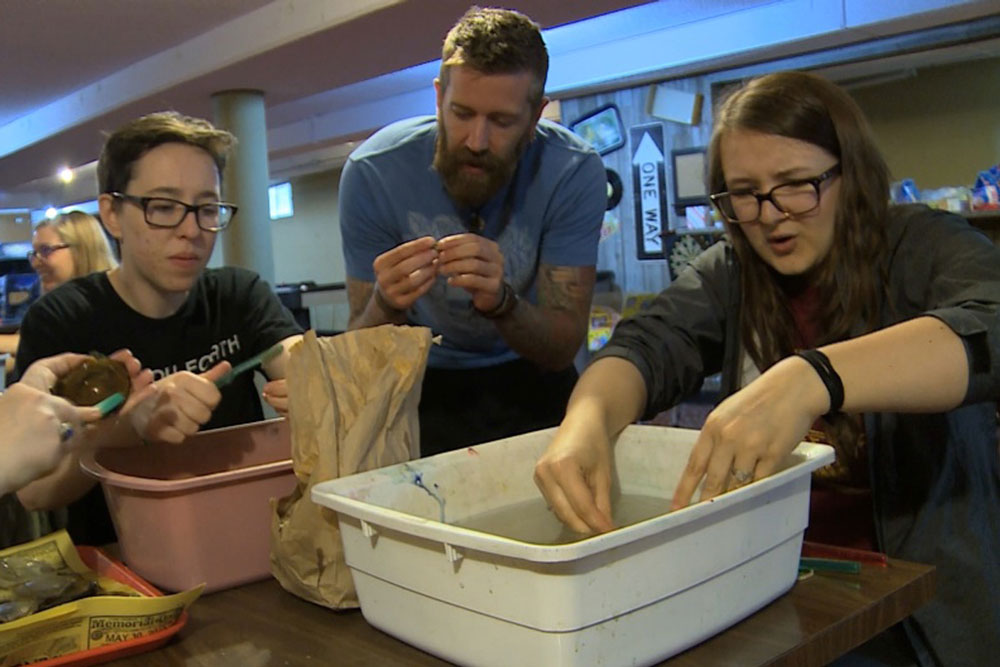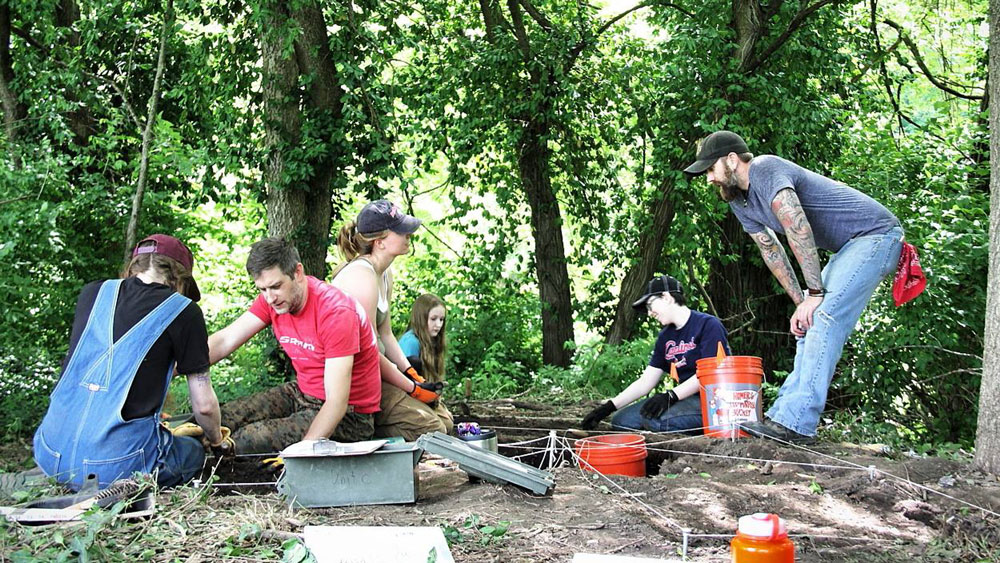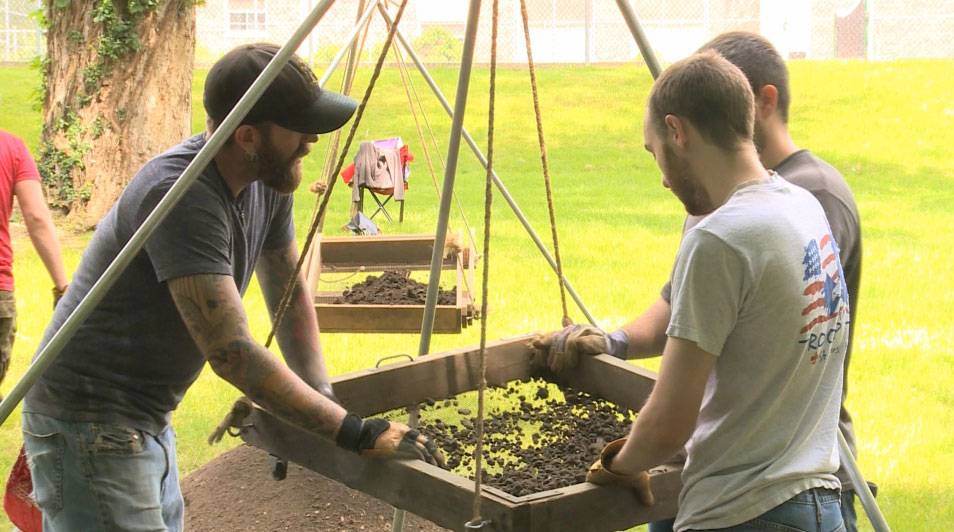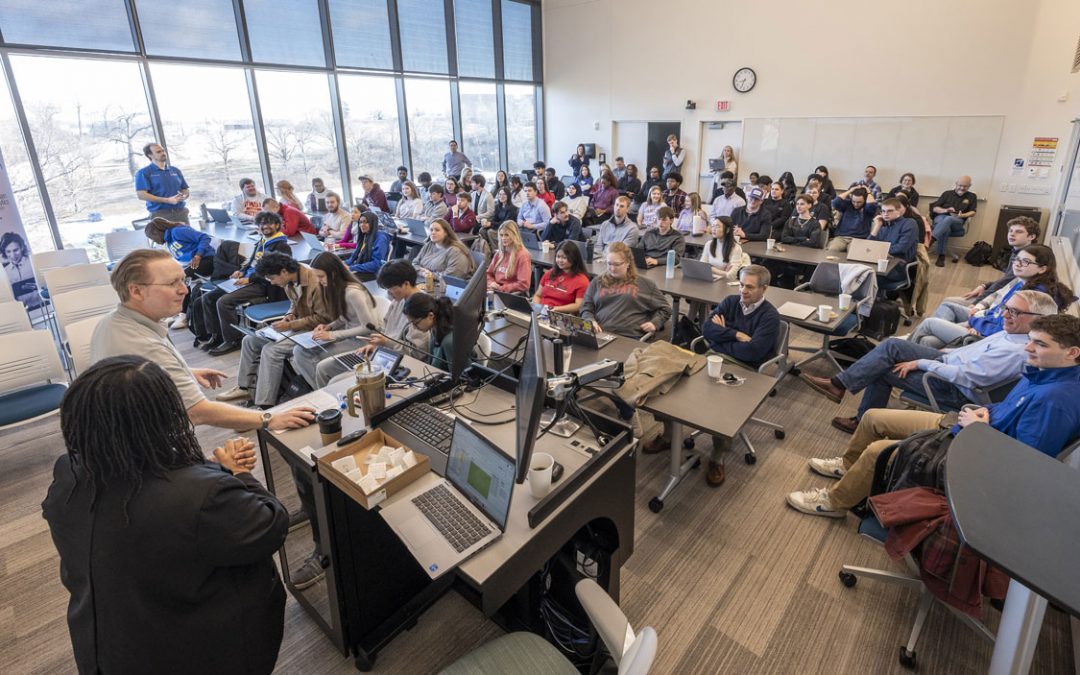![UMSL archaeology instructor Daniel Pierce leads an excavation at Regent spring as part of the summer Excelsior Springs [Mo.] Field School he started in 2015. This year's dig was featured in a mini documentary made by Missouri School of Journalism Professor and KOMU (Channel 8) reporter Jamie Grey. (Photo by Kevin Morgan, Kevin Morgan Photography)](https://blogs.umsl.edu/news/files/2016/06/field_school_kevin-morgan-photo-818.jpg)
UMSL archaeology instructor Daniel Pierce (at left) leads an excavation at Regent Spring as part of the summer Excelsior Springs [Missouri] Field School he started in 2015. This year’s dig was featured in a mini-documentary made by Missouri School of Journalism Professor and KOMU (Channel 8) reporter Jamie Grey. (Photo by Kevin Morgan, Kevin Morgan Photography)
A group of University of Missouri–St. Louis students spent time in Excelsior Springs, Missouri, earlier this summer digging, quite literally, into the history of the small town as part of a field school offered through UMSL’s Department of Anthropology and Archaeology.
Last year, archaeology expert, alumnus and adjunct instructor Daniel Pierce began the Excelsior Springs Field School, which accepts up to 15 students each summer who want to get their hands dirty and learn about archaeology fieldwork for two weeks. This year’s efforts caught the attention of Missouri School of Journalism Professor and KOMU (Channel 8) reporter Jamie Grey, who documented the dig and uncoverings. (Click here to watch her piece or scroll below to play the embedded video.)

Using toothbrushes and water, Daniel Pierce (center) and UMSL students clean artifacts unearthed earlier in the day. (Photo by Jamie Grey)
After watching Grey’s mini-documentary, UMSL Daily caught up with Pierce on Excelsior Springs and the opportunities field experiences present UMSL students.
What drew you to Excelsior Springs?
The city has an amazing history that is all around you. Excelsior Springs, which today has only around 12,000 people, used to get over 10,000 visitors a day at just one of the mineral springs – not to mention the amazing spas and hotels that drew visitors from around the world. This was a real tourist hot spot for the first half of the 20th century, and hardly anyone even knows about it today. Even Al Capone loved the place, and there is no shortage of stories about him and other celebrities from the area who frequented the city. There are few cities that I have been to with such a rich and interesting history. When I got the opportunity to start my own field program, Excelsior Springs was my first choice. I want to be a part of rediscovering that history. Plus, the city is great to us, and we are incredibly grateful for their hospitality. So it is our pleasure to help them promote their unique and interesting past before it is lost forever.

On hands and knees, students spend the day carefully brushing away dirt from artifacts and old structures covered by earth. (Photo by Kevin Morgan, Kevin Morgan Photography)
What does the field school offer UMSL students?
It offers students an opportunity to learn the ropes in a real archaeological site. This is not some site that has already been combed through and is just being used as a training site. We are doing real work here, making discoveries together that not even the local historians and museums know about yet. It’s a pretty incredible feeling to discover something – an object, a wall or even just new information –that no one has seen or known about for generations.
Do you have any specific goals in mind with the field school?
I want to teach the students all of the things that may be asked of them if they take a job in archaeology after graduation. If their new boss tells them, “Can you go set up an excavation unit over there?” or “Can you map out that unit?” I want them to be able to get right to it. This will make their job easier and make them more valuable in the workforce. Being pre-trained for the field will give them a leg up on other potential employees that don’t have real-life field experience.

Daniel Pierce (at left) teaches students what to look for as they sift through earth and dirt, often finding bits of broken glass, but occasionally finding an unusual artifact. (Photo by Jamie Grey)
Besides excavations, what else do students experience at the Excelsior Springs Field School?
This year and last, we got to tour some of the historic sites and museums in Excelsior Springs, as well as the Archaeometry Lab at the University of Missouri – Columbia Research Reactor. This lab is one of the top archaeological science labs in the world and analyzes things like ancient pottery and stone tools through chemistry and physics.
What’s one of the best parts of the field experience?
I believe a big part of the field experience is the camaraderie that is developed with the rest of the crew. Being able to spend two weeks side by side with your fellow students working, eating, relaxing and basically living together is a great way to develop that. A group of students who previously barely knew each other can become such great friends by the end of two weeks together.
How can students get involved in the field school?
Students need only to sign up for it like a normal summer class. We make all of the arrangements for lodging out there. Once enrolled, I will get them all of the information they need. Students don’t even need to be anthropology majors. This year, we had students from history, sociology, chemistry, biology and even music.
To read about additional UMSL archaeology field experiences, click here. Students interested particularly in the Excelsior Springs Field School can contact Daniel Pierce via email or come by his office on campus in 512 Clark Hall.















